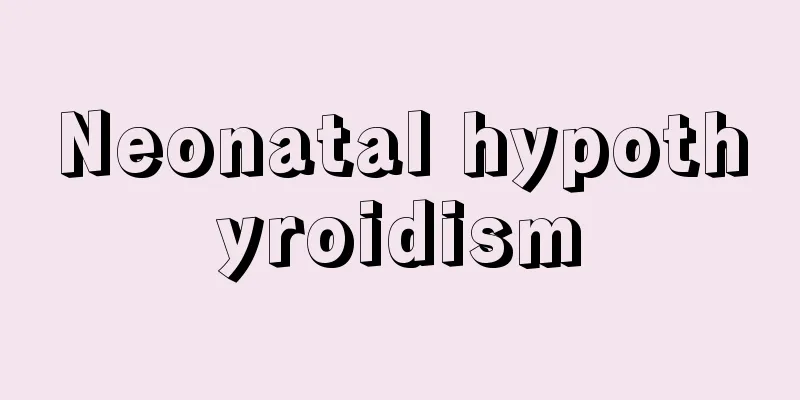Neonatal hypothyroidism

|
Various physical conditions that occur during pregnancy will have an impact on the fetus, so women need to undergo many examinations during pregnancy, and the doctor will judge the growth and development of the fetus based on the examination results. Some newborns have hypothyroidism. What should parents do if their newborns have this disease? Parents, let's learn about the symptoms of babies with congenital thyroid dysfunction. 1. Symptoms of congenital hypothyroidism in newborns Most children with congenital hypothyroidism are asymptomatic at birth because maternal thyroxine (T4) can cross the placenta and maintain 25% to 75% of the normal T4 concentration in the fetus at birth. Tips: The early or late onset and severity of neonatal hypothyroidism symptoms are related to the intensity and duration of hypothyroidism, so if you want to check your child's thyroid function, you can wait until the baby is one month old. 2. Specific symptoms of congenital thyroid dysfunction in newborns 1. The anterior fontanelle is 4cm×4cm, the posterior fontanelle is 0.5cm, the height is low, the meconium is slowly discharged, constipation, prolonged physiological jaundice, less crying, hoarse and low crying, drowsiness, feeding difficulties, less food or no sucking, swallowing difficulties, choking, abdominal distension, umbilical hernia, sluggishness, body temperature does not rise, often below 35℃; 2. The skin is mottled, cool and wet, with many forehead wrinkles, a large, wide and thick tongue, mucus edema in the respiratory tract leading to nasal congestion and increased secretions, a bloated face, a low nose root, wide eyes, a low hairline, and white sebaceous rash on the face in patients with high blood lipids, shallow and difficult breathing, or even apnea; 3. Slow heart rate and dull heart sounds. 4. Symptoms of congenital hypothyroidism in newborns: If you have the following symptoms, you should go for a check-up and diagnosis When the following situations are encountered during the care of the baby, thyroid function should be checked routinely to confirm the diagnosis: feeding difficulties, growth disorders, low and hoarse crying, no fever, frequent abdominal distension and constipation, delayed jaundice, anemia, mental retardation, refractory hypoglycemia, pericardial effusion, unexplained low voltage, accompanied by premature delivery, macrosomia, and umbilical hernia. Hypothyroidism is an uncommon problem, and many congenital ones are even rarer. But rare does not mean that it does not occur. There are still some children who suffer from congenital hypothyroidism. If you find that your baby has the symptoms mentioned in this article, you need to be alert to whether the baby has hypothyroidism. |
<<: How long after breast development does menarche occur?
>>: Normal range of lead for two-year-old babies
Recommend
What to do if your baby has hard stools
Some stool conditions of babies usually reflect t...
How long does it take for a newborn to shed tears?
For many people, crying is a very simple thing in...
Children have a lot of sticky eye mucus
Since children do not know how to express themsel...
What disease is the baby's nail purple?
Parents should pay attention to the baby's he...
What should I do if my child grows slowly?
All parents hope that their children can grow tal...
Can the Breathing Baby Cream be used?
When taking care of their babies, many mothers fi...
Can children with rhinitis be cured?
In recent years. The quality of the air has decli...
What should I do if my baby has phimosis? These methods solve
If a child is found to have phimosis, there are c...
What causes myocarditis in children?
Pediatric myocarditis is often caused by viral in...
What should I do if my baby’s tooth enamel is not fully developed?
It is common to see some children whose teeth tur...
How to take care of a child's slow growing hair?
When babies are born, we find that some babies ha...
What are growing pains?
Growing pains are actually some pain problems aro...
What's the matter with the hard lump on the baby's arm after the injection?
The health of the baby is a very important matter...
Parents must know: These 7 kinds of fish should not be given to children
Children whose bodies are still developing can su...
Diet for children with uremia
Uremia generally only occurs in the elderly, but ...









